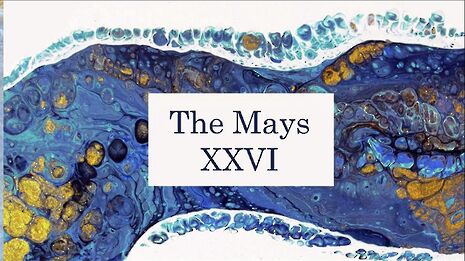The Mays review: ‘represents the cities and universities as well as any postcard’
Every year The Mays publishes poetry, prose and artwork from talented students at Oxford and Cambridge universities. William Poulos is, by and large, impressed

Another year, and The Mays is upon us once again. Over 100 pages long and including contributions from about 50 authors, this year’s edition resembles the cities of Oxford and Cambridge. Some parts are beautiful, some parts are crowded, and some parts are less accessible. The best writing in it represents the cities and universities as well as any postcard.
Louie Broadhead’s story ‘Viaticum’, about a young Catholic boy, somehow manages to contain a perfectly-paced narrative within four pages. Its initial humour imperceptibly shifts to something darker as it describes the boy’s accidental sin and deliberate penance. The comic triumph of this collection is Martha West’s poem ‘Guinevere’, written in loose octosyllabics from the perspective of Guinevere herself. The rhymes in it are hilarious. Here is how Guinevere, sexually unsatisfied with her husband, King Arthur, describes her first encounter with Lancelot:
He made me scream on the Round Table,
The kitchen, armoury, anywhere available
Bodice ripping
Tunic ablaze
Farewell to le petite morte d’Arthur days.
Unfortunately, separating “bodice ripping” and “tunic ablaze” slightly blunts the force of these lines. The word “ripping”, is spatially and sonically isolated from everything else; it is emphasized but doesn’t rhyme with anything, which is a shame as the poem is so successful because of its rhymes. Uniting the third and fourth lines and separating the two phrases with a comma keeps the rhythm and the rhyme and removes the distraction created by the word “ripping” ending a line. This would create a strong, memorable couplet and make the layout work with the sound rather than against it.
The line is not imitative, it is something better: instantly evocative and instantly memorable
The syntax in ‘Guinevere’ is always clear, but this isn’t the case in many other pieces. The first piece included in The Mays is a story called ‘A Row of Artichokes to Keep the Spirits Away’, which is a nice title and an interesting idea, but the chronology and causation are confused: “I had only realized later that I had planted rows of massive artichoke plants along the perimeter of the property, in order to keep the spirits away, because of my grandmother.” Against the spirits of clarity and grammar, the artichokes are an industrial-strength repellent. What, exactly, did the narrator do because of his grandmother? Did he plant artichokes because of his grandmother, or is he trying to keep the spirits away because of his grandmother?
On top of being confusing, the sentence is grammatically incomplete: it has two pluperfect-tense verbs (“had realized” and “had planted”), a tense which cannot exist alone in a sentence because it denotes an event which happened before the past-tense main verb. There is no past-tense main verb. Maybe the spirits stole it. Or maybe they placed an extra “had” before “realized”. Due to the near-extinction of copy editors, errors like this are becoming more common even in prestigious literary journals, but that doesn’t excuse anyone.
Everyone outside of Oxbridge should read Katherine Robinson’s poems ‘Crane Bag’ and ‘Bath’. Bath is in free-verse, but there’s a clear structure: the first two stanzas are in past tense and the last two are in present tense describing the speaker’s continual struggle to comprehend another’s recent death. The poem’s central theme is the fluidity between life and death, and the descriptions of water and fluid make the poem a coherent whole. One line in the poem describes the sea as “endlessly cresting off the gray Maine coast”. Here, as she does throughout her poems, Katherine Robinson has beautifully combined sound and sense. The line is not imitative, it is something better: instantly evocative and instantly memorable. ‘Crane Bag’ is a retelling of an old tale involving a sea god and a woman who is turned into a crane. She eventually leaves the sea god who loves her, and after two-and-a-half sections of vivid description the poem hits you with a beautifully-abstract line: “Just past what he could conquer, / loss changed shapes.” If The Mays keeps publishing stuff this good, it might attract that vital yet absent quality copy editor.
Disclaimer: The Mays Literary Anthology is published by Varsity Publications, which also publishes Varsity newspaper
 News / Meta opens £12 million lab in Cambridge 11 July 2025
News / Meta opens £12 million lab in Cambridge 11 July 2025 Lifestyle / Reflections on rowing10 July 2025
Lifestyle / Reflections on rowing10 July 2025 News / Write for Varsity this Michaelmas13 July 2025
News / Write for Varsity this Michaelmas13 July 2025 News / Newnham students warned against using ‘secluded or concealed routes’ in evening after student followed16 July 2025
News / Newnham students warned against using ‘secluded or concealed routes’ in evening after student followed16 July 2025 Features / How to catch a coat thief13 July 2025
Features / How to catch a coat thief13 July 2025









